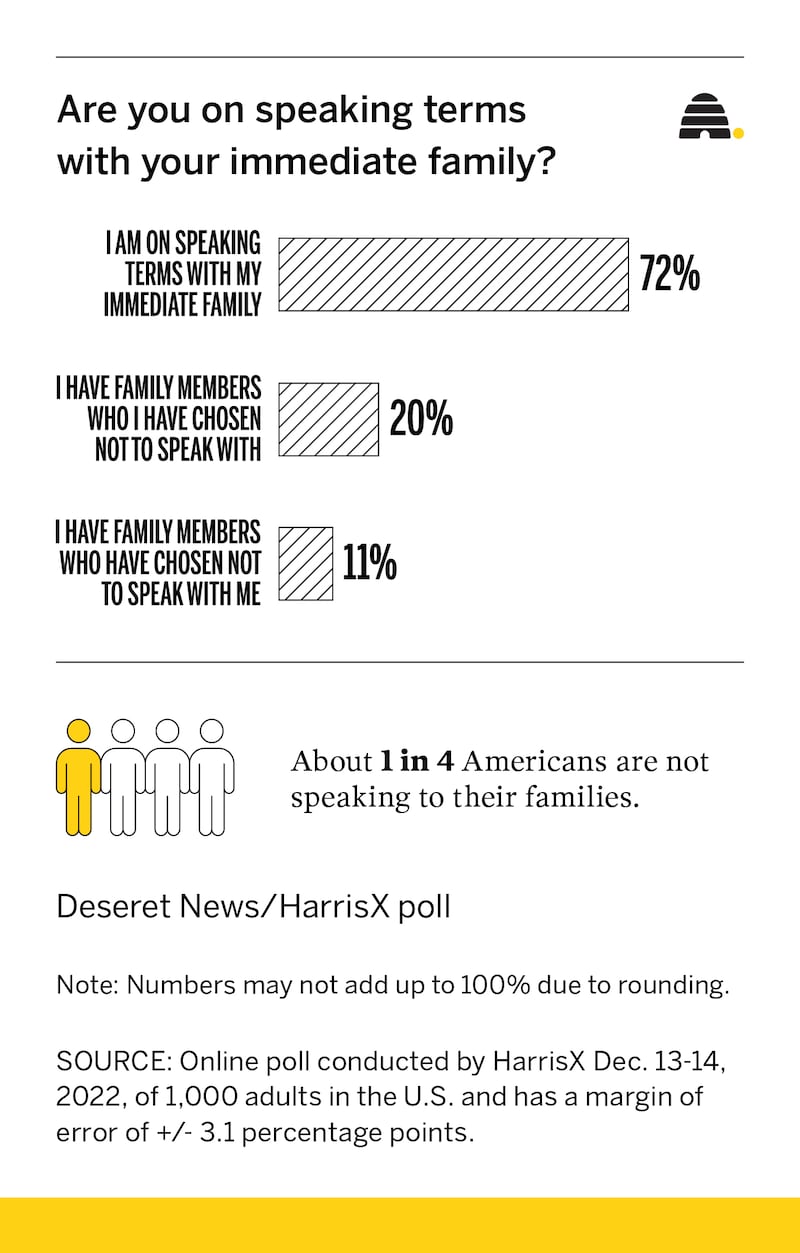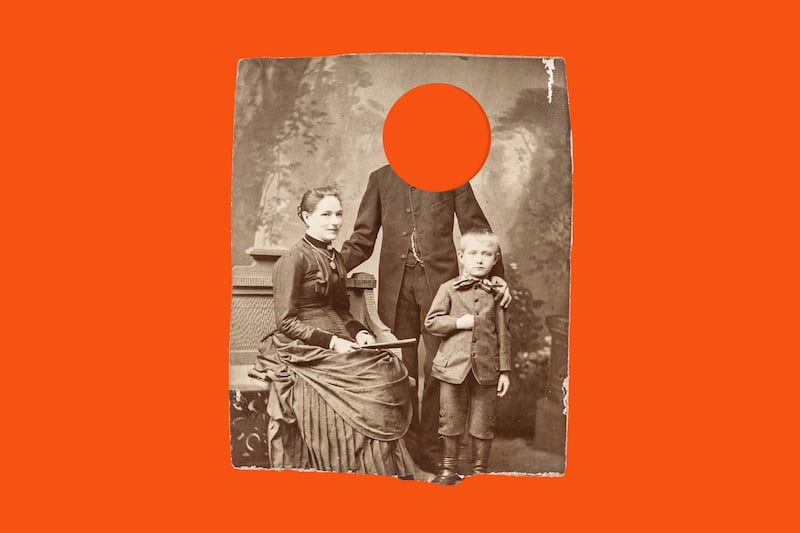If your holiday festivities will be missing a few familiar faces because of hard feelings, you’re not alone.
While more than 7 in 10 adults said they are on speaking terms with the members of their immediate family — think parents, children, siblings — roughly a fourth said they are not speaking to a member of their family, according to a HarrisX poll for Deseret News conducted last week.
In a poll of 1,000 individuals, with a margin of error 3.1 percentage points, 20% said they have chosen not to speak to a family member and 11% said a family member has chosen not to speak to them.
Chasms grow between people for lots of reasons — family trauma, parental favoritism, disagreements over sexuality, politics and faith. Money rears its head a lot. Several years ago, Troy Dunn, then star of TV’s “The Locator” and author of “Family: The Good F Word,” told the Deseret News that he thinks neglect creates the most rifts: “Things we do for perfect strangers that slowly we begin to not do for the people closest to us. You tolerate annoying strangers but snap at family and say things you would not say to a stranger in the mall.”
People forget injury inflicted by a stranger but may revisit harsh words from someone close.
“I believe time heals almost no wounds,” said Dunn. “What heals a wound is good treatment. That doesn’t come from sitting there, waiting. ... People 15 years later can recite with incredible accuracy the words that wounded them. The only way is to replace them with new words.”
Hurtful holidays?
Family estrangement is more common than many people think and is often a source of great emotional pain. And with the holidays drawing many families together, Joshua Coleman, a Ph.D. clinical psychologist and author of “Rules of Estrangement: Why Adult Children Cut Ties and How to Heal the Conflict,” says those he counsels sometimes wonder if the holidays can aid healing or if it’s better to wait.
That depends, says Coleman, a senior fellow in the Council on Contemporary Families.
“One of my common recommendations for estranged parents is for them to write some kind of letter of amends to the estranged adult child. A question I’m getting a lot presently is whether it’s better to send a letter before the holidays, on the holidays, or after them? It highlights the ways that the holidays can be fraught for all parties concerned,” he told the Deseret News.
“I don’t think that we know enough to know whether people are more likely to reconcile or become estranged during the holidays. On the estrangement side, if someone is considering estrangement, then certainly the close, intense, in-person family visits may exacerbate conflicts that are barely tolerated or lying just beneath the surface,” he said.
Conversely, he added, for someone who is thinking about reconciling, positive holiday memories could provide some helpful impetus toward reaching out.

While parent-child estrangement can be devastating, losing the affection of a brother or sister can be just as awful, as Fern Schumer Chapman recounted in her book “Brothers, Sisters, Strangers” in 2021. She told Deseret News that siblings are our first playmates and with them we learn social qualities like loyalty and sharing and getting along. In happy cases, she said, sibling relationships are the longest of one’s life, surpassing friendships, marriages and the relationship with parents.
The American Psychological Association’s Handbook of Contemporary Family Psychology bears that out, noting that how a person gets along with a sibling reliably predicts emotional health later. Healthy sibling bonds are linked to self-esteem, academic performance, and less loneliness and depression, among other benefits.
It also feels different if you are the one distancing, versus the one being pushed away, said Crystal Bowman, a marriage and family therapist at the Arizona Family Institute in Mesa.
“Distance can be a good thing if the dynamics of the family are unhealthy and hurtful. When someone decides to push away, it can be after years of attempting to communicate and negotiate healthier interactions,” she said.
But other times, “estrangement can cause more pain and misunderstanding for everyone. A decision to distance and decrease communication may be used to try to control or demand from other family members,” Bowman added, noting that two things are involved in every estrangement, regardless of cause: pain and control.
“Family members experiencing estrangement would benefit from taking a look at themselves individually and consider how you might be contributing to the power dynamics, pain and communication breakdown,” Bowman said.
Lisa Bahar, a marriage and family therapist in Dana Point, California, sees reconciliation as a series of doable actions, starting with acknowledging that there are reasons that you and someone else stepped back from each other. You have a right to feel the way you do, she said, “based on what lead up to the estrangement. This avoids blame and removes the tendency” to insist you’re in the right.
She finds several practices helpful, including journaling, praying, meditating and participating in therapy to process feelings. She also warns that “many times, estrangement is fueled by other members of the family which increases the intensity of the situation.” So trust your gut, not theirs.
One helpful approach is simply seeking to understand. But there’s a caveat. “This can be more challenging for extreme situations, betrayals, abuse or highly intense situations,” she said, so people need to know their own bottom lines and when to step back or away. Estrangements may take time to mend, so she suggests moving slowly to “allow space for more tension as you break through to potential healing.”
Bahar said to plan ahead for what might happen. If you know you tend to yell or shut down — opposite reactions — you’ll better manage them. “If safety is at risk, avoid it and consider other options of “forgiving” or “accepting” the rift.
To that, Bowman adds, “Focus on the present” and stay calm.
All of the experts interviewed for this story agreed that sometimes estrangement is the healthiest option, and those considering working through it need to take a clear-eyed look at whether reconciling would be helpful or harmful.
Bahar also noted that accepting the reality of what happened and why “does not mean you approve of it, but rather that you are willing to heal, mend, grow and move forward.”
She emphasized the importance of seeing the estrangement from different perspectives. That’s hard, she said, “but takes the anger intensity down when you can view the situation” from someone else’s point of view.
Finally, Bahar said that you may want to practice the conversation before you contact someone with whom you are estranged. And she said to avoid texting, which leaves too much room for even more misunderstanding and escalated emotions. It’s more helpful to have that kind of conversation in person or by phone or Facetime.


